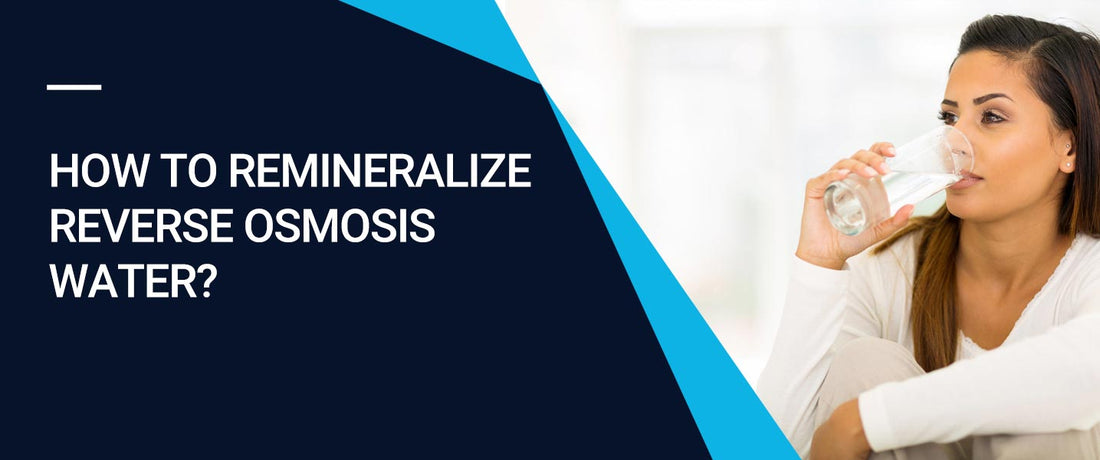Reverse osmosis is one of the most effective water filtration technologies out there and its demand has consistently increased over the years. Reverse osmosis systems deliver excellent quality drinking water by removing all harmful contaminants such as chlorine, fluoride, heavy metals, sediments, organic matter and other toxic chemicals from water. Unfortunately, while reverse osmosis systems remove all these contaminants, they also strip out the good minerals which are needed by the human body. You might ask should you invest in reverse osmosis systems? Should you continue to drink RO water if you already have one? In this blog, we take a closer look at the quality of RO water and answer these questions.
What Minerals Does Reverse Osmosis Remove?
Reverse osmosis will generally remove any molecular compounds smaller in size than water molecules. In general, reverse osmosis systems can remove more than 95% of contaminants in water which also includes healthy minerals as their molecular size is greater than that of water. Some of the minerals that are removed by the reverse osmosis process are:
Calcium
Humans need calcium to build and maintain strong bones and 99% of the body’s calcium is in the bones and teeth. The body also needs calcium for muscles to move and for nerves to carry messages between the brain and every body part. In addition, calcium is used to help blood vessels move blood throughout the body and to help release hormones and enzymes that affect almost every function in the human body. Insufficient intakes of calcium do not produce obvious symptoms in the short term because the body maintains calcium levels in the blood by taking it from bones. Over the long term, intakes of calcium below recommended levels have health consequences, such as causing low bone mass (osteopenia) and increasing the risks of osteoporosis, bone fractures, numbness and tingling in the fingers.
Magnesium
Magnesium is an important mineral, playing a role in over 300 enzyme reactions in the human body. Its many functions include helping with muscle and nerve function, regulating blood pressure, and supporting the immune system. Doctors link magnesium deficiency with a range of health complications such as muscle cramps, numbness, tingling, seizures, heart rhythm changes and spasms. In some cases, a magnesium deficiency could also lead to Alzheimer’s disease, type 2 diabetes, cardiovascular disease, and migraine.
Trace Minerals
Trace minerals, also called micro minerals, are essential minerals that the human body needs in very small amounts. Trace elements function primarily as catalysts in enzyme systems. The reverse osmosis removes minerals such as zinc, iron, iodine, copper, fluoride, selenium, chromium etc.
Should You Stop Drinking Reverse Osmosis Water?
Definitely not. RO water doesn’t have many of the essential nutrients you need for your health. But neither does normal tap water either. The amount of these healthy nutrients is in fact very small. The contaminants, on the other hand, are much more numerous. The fact that RO water is free from harmful contaminants gives a peace of mind that the water you are drinking is safe. While our bodies do need essential minerals to function properly, we obtain these minerals in much higher concentrations in food. The solution isn’t to avoid reverse osmosis but instead to add minerals to the water. This means remineralising RO water so you can enjoy the benefits of contaminant-free water but still get the essential minerals the body needs.
What are the Benefits of Adding Minerals to RO Water?
Have you ever had a drink from a mountain stream bubbling full of mineral content and appreciated how fresh and great tasting it was. Here are some benefits of adding minerals to your water.
Improves the taste of water
Pure water is colourless, odourless and tasteless liquid. The fact that RO systems eliminate everything from water, the tastes may put you off especially if you are used to drinking tap water or bottled mineral water. Minerals are what give water its great taste and raise the pH to healthy levels.
Source of minerals
You cannot rely on trace minerals in drinking water to survive. While certain foods can provide some of what we need, mineral-rich drinking water fills the gap between what we can consume from food and the daily recommended levels.
Encourages hydration
Trying to drink more water every day can seem at best boring and repetitive and at worst well, a little torturous especially if the water isn’t appealing. Adding minerals back to water will taste better than what's coming out of the tap, is cheaper than bottled water and definitely healthier than sugary soda drinks.
How to Remineralise RO Water?
You shouldn’t be relying on your water to give you all the minerals you need, but you shouldn’t be stripping your water of minerals either. Allowing minerals like calcium and magnesium to re-enter your purified water improves its taste and can have the added benefit of also improving your health. Here are a few ways to add minerals to water:
1. Buy an RO system with mineralization
Basic RO systems only have 5 stages of filtration: 3 pre-filters, an RO membrane and a post-filter. Buying a reverse osmosis system with a remineralisation filter is an excellent and hassle-free option for adding minerals back into the water. This filter is usually added as the 6th stage on the system and sits between the holding tank and the faucet. They might be a bit expensive than the basic RO systems but are totally worth the investment. Our Ecosoft 6 stage RO system is highly popular among our customers due to the excellent quality and reliability it offers.
2. Add a Remin filter to your RO systems
If you’ve already bought an RO system without a mineral filter, don’t worry, you can still add one. All you need to do is simply add a remin filter that’s designed for easy installation at your main water line, just after your reverse osmosis unit. If you’re buying a separate remin filter, make sure that it comes with its own housing and connections, and isn’t designed to be installed in a dedicated filter system. We also sell remineralising filters on our website that are compatible with any standard under-sink RO system.
Final Thoughts
Just because a RO system strips everything from water shouldn’t put you off from buying them. You can enjoy a lot of other benefits and the fact that you can remineralise the filtered RO water makes them an ideal choice for any household. If you are looking to improve the quality of your drinking water, you have come to the right place. Our team of experts will work with you to understand your unique requirements and recommend the best solution that fits your budget. Request a Call

